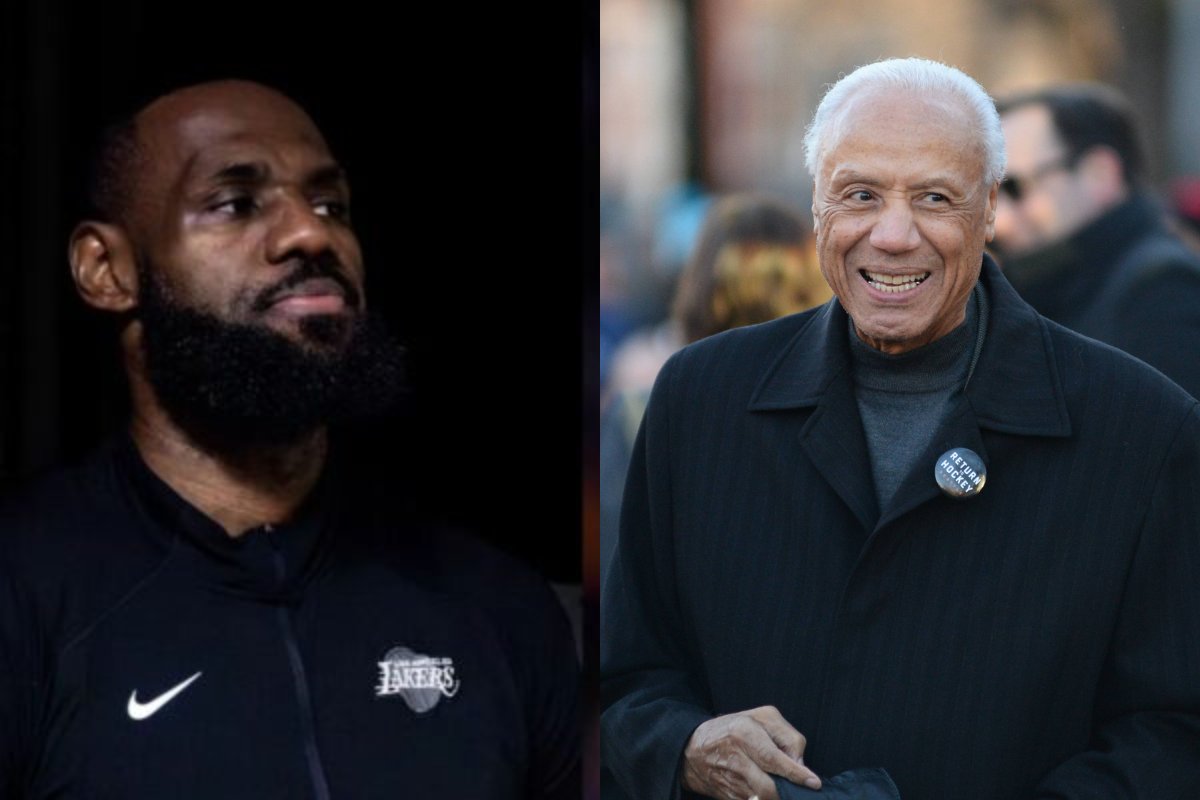
Imago
imago

Imago
imago

Imago
imago

Imago
imago
The NBA world is in mourning after the passing of legendary three-time Hall of Famer Lenny Wilkens, who died Sunday at the age of 88, surrounded by loved ones. Often revered as the Godfather of Seattle, Wilkens wasn’t just the architect behind the city’s lone NBA championship in 1979, his influence stretched far beyond one team or era.
Watch What’s Trending Now!
From his days as a player-coach with the Cavaliers to his decades-long impact on the game, Wilkens embodied class, intellect, and leadership. And now, one Cavaliers legend has stepped forward to give the icon his well-deserved flowers.
LeBron James took to social media to pay his respects, sharing a heartfelt throwback from 2022, a moment of the two smiling together on the court. Alongside the photo, LeBron wrote, “RIP LEGEND!!!!! 🕊️🕊️🕊️🤎 You’ll be missed! Always was an honor to see you throughout the years.”
Though the two greats never crossed paths on the court, the city of Cleveland connects LeBron James and Lenny Wilkens in a special way. For Wilkens, the Cavaliers became more than just another stop in his illustrious career, they were a place where his basketball mind shaped a franchise’s identity throughout the late 1980s and early ’90s.
RIP LEGEND!!!!! 🕊️🕊️🕊️🤎. You’ll be missed! Always was an honor to see you throughout the years https://t.co/Pfb7xTJCHo
— LeBron James (@KingJames) November 11, 2025
Between 1986 and 1993, Wilkens guided the Cavs to some of their most successful years in team history. He delivered three 50-win seasons, including a then-record 57 victories in both the 1988–89 and 1991–92 campaigns.
Under his leadership, Cleveland made five playoff appearances and even reached the Eastern Conference Finals for just the second time in franchise history. Yet, despite their promise, the Cavaliers’ dreams often ended at the hands of Michael Jordan’s Chicago Bulls, a rivalry that defined much of that era.
Wilkens’ bond with Cleveland ran deeper than coaching alone. Long before he led from the sidelines, he wore the Cavaliers jersey as their point guard from 1972 to 1974, even earning an All-Star nod in 1973.
Decades later, the franchise honored him again, inducting him into the Cavaliers Wall of Honor in 2022. To this day, his 316 regular-season wins remain the most by any coach in team history, a lasting testament to the man who helped lay the foundation for what Cleveland basketball would become.
Wilkens guided the Cavaliers from 1986 to 1993, but his time in Cleveland ended on a sour note. Years later, he admitted that the 1989 trade of Ron Harper, a move made without his approval, played a key role in his decision to leave.
The fallout from that deal strained his relationship with then-General Manager Wayne Embry, with the two reportedly not speaking for years afterward.
But beyond the wins and history, Lenny Wilkens always had a soft spot for players who carried themselves with courage, and LeBron James was one of them.
Back in 2018, when asked about LeBron’s willingness to speak up on social issues, Wilkens didn’t hesitate to applaud him. “And I think when you have a position and you can speak out, speak out,” Wilkens said firmly. “His speaking out isn’t hurting anybody. What it’s doing is bringing attention to what’s wrong. And we all should be about that.”
The unshakeable legacy of Lenny Wilkens
Lenny Wilkens’ story began in Brooklyn, New York, where a young boy from the Bedford–Stuyvesant neighborhood found his rhythm on concrete courts long before he found fame under bright lights.
Born on October 28, 1937, to a Black American father and an Irish American mother, Wilkens was raised in a Catholic household that valued discipline and heart. Those values shaped his game.
By the time he arrived at Providence College, that poise had turned into greatness. He became a two-time All-American, leading the Friars to back-to-back NIT appearances and closing his college career as one of the school’s top scorers.
The St. Louis Hawks saw that spark early, taking him sixth overall in the 1960 NBA Draft. From there, Wilkens became the epitome of consistency, a floor general who made every teammate better.
Even a stint in military service couldn’t slow him down; he returned to lead the Hawks to six straight playoff runs and finished second in MVP voting to Wilt Chamberlain in 1968.
Over 15 seasons with the Hawks, SuperSonics, Cavaliers, and Trail Blazers, he poured in 17,772 points, earned nine All-Star nods, and twice led the league in assists. His smooth command of the floor made him not just a great player, but one who naturally transitioned into leadership, both on and off the court.
That next chapter, coaching, turned Wilkens into an NBA institution. He started as a player-coach in Seattle and Portland, unsure at first but soon realizing he was born for it. “I had nothing to lose,” he once said, “I’d try it and see if I liked it.” What followed was a career that redefined longevity and excellence.
He guided the SuperSonics to their first winning season and later to their only championship in 1979, leaving fingerprints all over every franchise he touched.
Beyond the court, Wilkens gave back as an analyst, executive, and mentor, always lifting the game and the people around it.
Today, he’s succeeded by his family and loved ones, but his presence still lingers in every unselfish pass, every smart play, and every coach who believes in doing things the right way.

